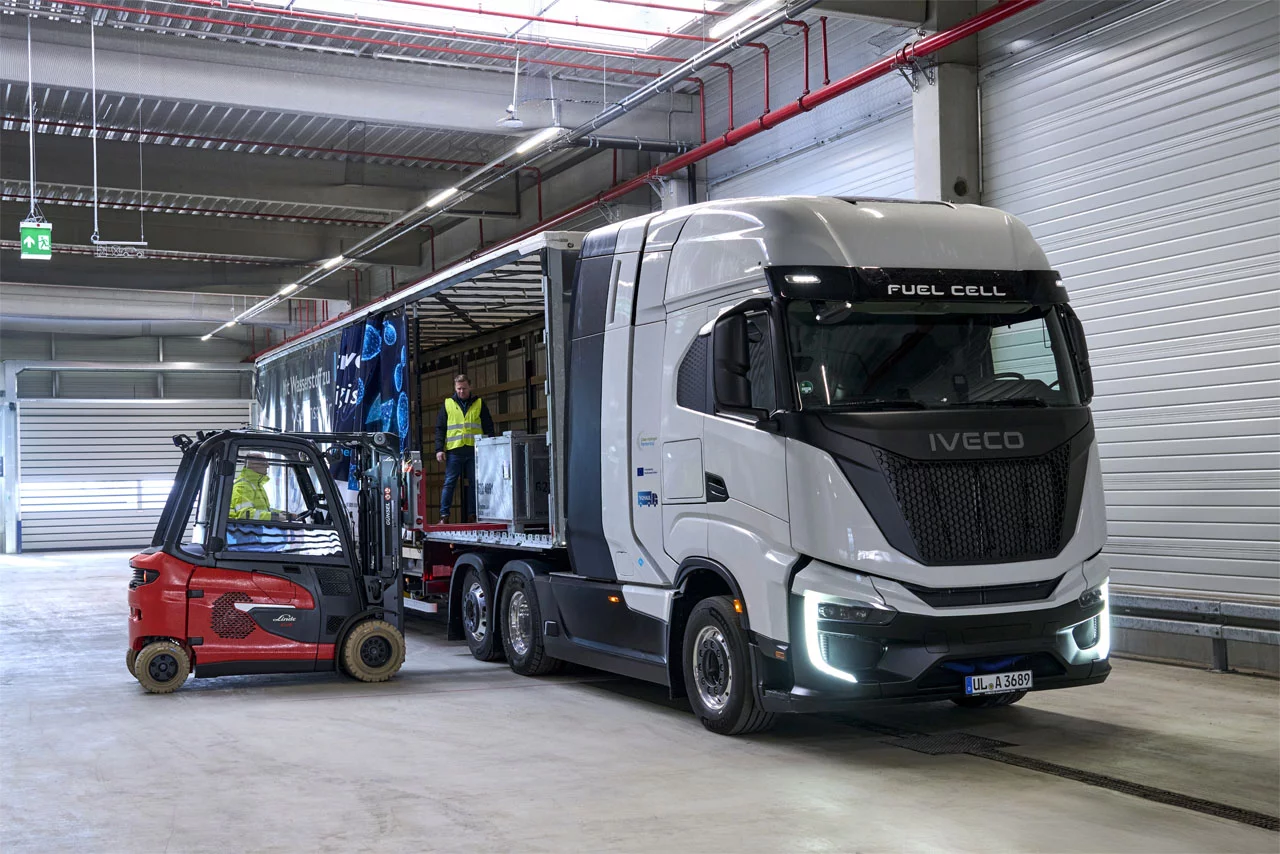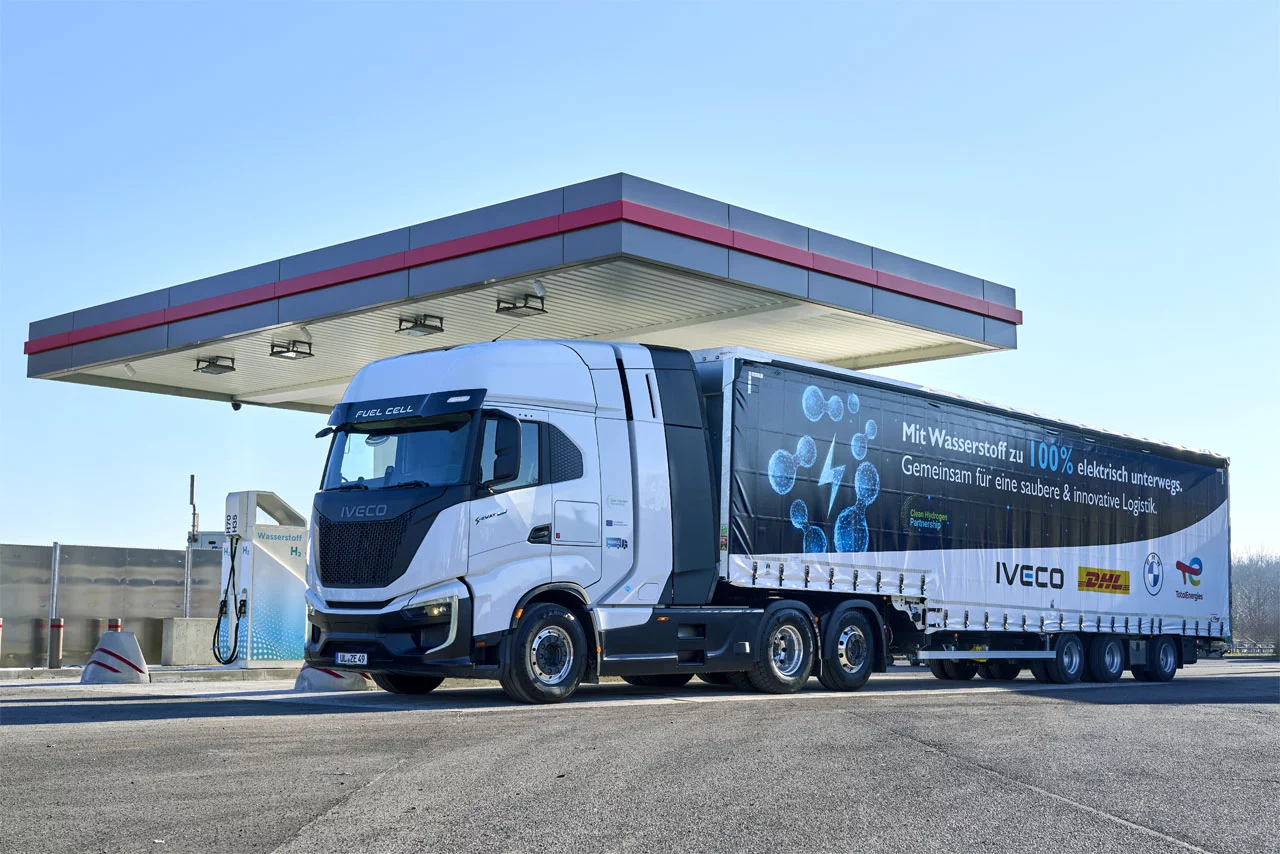The BMW Group is driving the future of emission-free heavy-duty transport – with pilot operations of the first hydrogen trucks now underway at Plant Leipzig as part of the H2Haul project. Demonstrating its openness to different technologies once again – including in logistics – the BMW Group’s involvement is one component of its more comprehensive hydrogen strategy connecting transport, production and products.
Emission-free Heavy-Duty Transport
The BMW Group is taking the next step towards sustainable transport logistics: two local emission-free fuel-cell trucks are now entering pilot operations. Part of the European H2Haul project supporting hydrogen-powered freight transport, the trucks will travel between Leipzig, Landsberg and Nuremberg to see how their drive technology performs in everyday operations. In addition, state-of-the-art hydrogen filling stations are currently under construction at Leipzig and Hormersdorf (northeast of Nuremberg) to offer the fast refuelling necessary for truck operations to succeed. The project is being realised by the BMW Group in conjunction with Iveco, DHL and TEAL mobility.
“The right choice of transport is important in global logistics, as elsewhere, to keep us future-focused and efficient in our work. So, transport logistics is another area reflecting the BMW Group’s open-minded approach to technologies. For the first time, hydrogen-powered trucks will support series production in German car manufacturing. We have been working on the project for a number of years now and are rolling out this pilot fleet in collaboration with our partners. It’s an important milestone as it will give us experience of how these trucks work in series operations and help us continue enhancing this crucial technology,” says Michael Nikolaides, head of Production Network and Logistics at the BMW Group.
The H2Haul project looks at how hydrogen fuel cell-powered trucks perform in real-world driving and what they can contribute to fossil fuel-free heavy-duty transport. All in all, 16 vehicles are involved, subsidised by the Clean Hydrogen Partnership and operating across Europe. Of those, two are IVECO S-eWay Fuel Cell trucks on the road for the BMW Group. Findings from the pilot project are expected to help enhance the technology and get it market-ready. A valuable addition to the battery-electric trucks already on the road, the hydrogen vehicles are quick to refuel and offer significant range. They are also flexible to use as they are independent of the charging infrastructure or grid development.
The BMW Group’s participation in the H2Haul project is a key cornerstone in its Reduced Logistics Emissions Strategy. This aims to achieve emission-free transport logistics, with a dedicated cross-departmental team developing measures to reduce CO₂ from the BMW Group’s road, rail and shipping transport worldwide. Drive technologies receiving a positive rating are advanced into pilot projects and new plant concepts, whose emissions data is then systematically recoded to enable accurate CO₂ reporting.

Fuel cell technology is not all the BMW Group is testing: it is also involved in the HyCET (Hydrogen Combustion Engine Trucks) project. In the future, this will see two 40-tonne and one 18-tonne truck powered by hydrogen combustion engines join its logistics fleet. Funded by the German Federal Ministry for Digital and Transport (BMDV), the HyCET project is being implemented by the BMW Group in conjunction with DHL, Volvo Trucks, Deutz, KEYOU and TotalEnergies.
By testing H₂ fuel cells and combustion engines simultaneously, the BMW Group is remaining true to its open-minded approach to technologies – including in logistics. While fuel cells work more efficiently, combustion engines are cheaper to produce as they essentially work on the same tried-and-tested principle as a diesel. The EU ordinance classes both hydrogen technologies as zero-emissions, and out on the road they are both being trialled on the same routes and refuelling at the same filling stations. The aim is to determine the best use case for each technology in BMW Group logistics.
Heavy-duty transport is not the only area where the BMW Group uses hydrogen: it also uses it within its own plants. Plant Leipzig is considered a pioneer in this regard, being home to the first indoor hydrogen filling station in Germany since way back in 2013. Today it operates five such facilities as well as one of the largest fleets of fuel cell-powered forklifts and tug trains in Europe. The latest filling station even offers fully automated refuelling – another first.
Innovative solutions are a defining feature in production too, where the BMW Group is the first carmaker in the world to roll out a brand-new type of burner, now on stream in Plant Leipzig. The new bivalent system can be powered by gas as well as hydrogen, and there are currently five such burners operating in contrast roof painting for the MINI Countryman. Further burners are currently being converted for hydrogen, with the longer-term aim of doing away with gas power completely and reducing CO2 emissions further. “Our vision at Plant Leipzig is to largely decarbonise production. We can achieve that, in part, by replacing fossil fuels with hydrogen,” explains Petra Peterhänsel, Plant Director at BMW Group Plant Leipzig, taking a longer view of the plant’s overall direction for the future.
similar news



